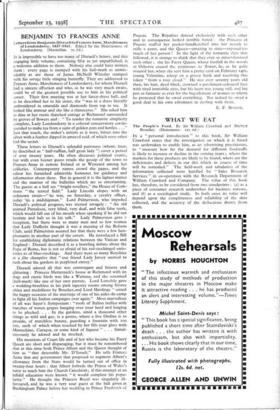BENJAMIN TO FRANCES ANNE
IT is impossible to have too many of Disraeli's letters, and this engaging little volume, containing fifty as yet unpublished, is
a-welcome addition to them. Nobody else could have written them : every page is stamped with his hall-mark as unmis- takably as are those of James McNeill Whistler stamped
with his savage little stinging butterfly. They are addressed to Frances Anne, Marchioness of Londonderry, for whom Disraeli had a sincere affection and who, as he was very much aware, could be of the greatest possible use to him in his political career. Their first meeting was at her fancy-dress ball, and as he described her to his sister, she " was in a dress literally embroidered in emeralds and diamonds from top to toe. It looked like armour and she like a rhinoceros." She asked him to dine at her rustic thatched cottage at Richmond surrounded by groves of flowers and : " To render the romantic simplicity complete, Lady Londonderry in a colossal conservatory conde- scended to make tea from a suite of golden pots and kettles. . . ." Just that touch, the maker's initials as it were, bitten into the silver with a feather dipped in amused acid, of which none other had the secret.
These letters to Disraeli's splendid patroness (whom, later, he described as " half-ruffian, half great lady ") cover a period of over twenty years. He often discusses political events, but with even keener gusto retails the gossip of the town to Frances Anne in remote Ireland or at Wynyard among her collieries. Contemporary names crowd the pages, and the editor has furnished admirable footnotes for guidance and information about these. But in general it is the lighter matter and the manner of the bulletins which are so entertaining. The guests at a ball are " bright revellers," the House of Com- mons " the tented field." Lady Lincoln elopes with an unknown swain—" he was, on Saturday, a cavalry officer, today 'tis a midshipman." Lord Palmerston, who impeded Disraeli's political progress, was treated savagely : " An old painted Pantaloon, very blind, very deaf, and with false teeth, which would fall out of his mouth when speaking if he did not hesitate and halt so in his talk." Lady Palmerston gave reception, but there were so many men and so few women that Lady Dufferin thought it was a meeting of the Reform Club, until Palmerston assured her that there were a few hen- pheasants in another part of the covert. He introduced a Bill for establishing diplomatic relations between the Vatican and England : Disraeli described it as a brawling debate about the Pope of Rome, but is not so afraid of his red-stockinged emis- saries as of blue-stockings. And there were so many Royalties at a fête champetre that " our friend Lady Jersey seemed to rush about the gardens in perplexed extasy."
Disraeli adored all that was extravagant and bizarre and glittering : Princess Metternich's house at Richmond with its dogs and exotic birds was like a Watteau, and she screamed (hall-mark) like one of her own parrots. Lord Lonsdale gave a wedding-breakfast in his pink tapestry rooms among Sevres china and medallions by Boucher, and Lord Hardinge " seized the happy occasion of the marriage of one of his aides-de-camp to fight all his Indian campaigns over again." Most marvellous of all was Sayer's Symposium : "roofs of Italian trellice with bunches of waxen grapes hanging over your head and longing to be plucked. . . . In the gardens, amid a thousand other things as wild and gay, is a grotto, where a live Ondine is to preside, of matchless beauty, guarding a fountain with 100 jets, each of which when touched by her fills your glass with Maraschino, Curacoa, or some kind of liqueur " . . . Simul- taneously he adored and he mocked.
His mentions of Court life and of her who became his Faery Queen are short and disparaging, but it must be remembered that at this time both Prince Albert and the Queen thought of him as " that detestable Mr. D'Israeli." He tells Frances Anne that any government that proposed to augment Albert's allowance from the State would be turned out of office in twenty-four hours : that Albert forbade the Prince of Wales's tutor to teach him the Church Catechism; if this attempt at an infidel education were known " it would complete his popu- larity." He thought the Princess Royal was singularly ill- favoured, and he was a very sour guest at the ball given at Buckingham Palace before her wedding to Prince Frederick of
Prussia. The Royalties danced exclusively with each other and in consequence looked terribly bored : the Princess of Prussia stuffed her pocket-handkerchief into her mouth to stifle a yawn, and the Queen—amazing to state—exposed too much of her person ! In the light of the romantic days that followed, it is strange to think that they ever so misunderstood each other ; she his Faery Queen, whose footfall in the woods at Osborne caused the primroses to flower, he, as he gaily assured her, when she sent him a pretty card on February 14th, young Valentine, asleep on a grassy bank and receiving this token " from a rosy cloud." He was over seventy years old then, his hair, dyed black, crowned a parchment-coloured face with tired immobile eyes, but his heart was young still, and his pen as fantastic as ever for the beguilement of women to whom he protested that he owed everything. But indeed he owed a good deal to his own adroitness in dealing with them.
E. F. BENSON.






































 Previous page
Previous page